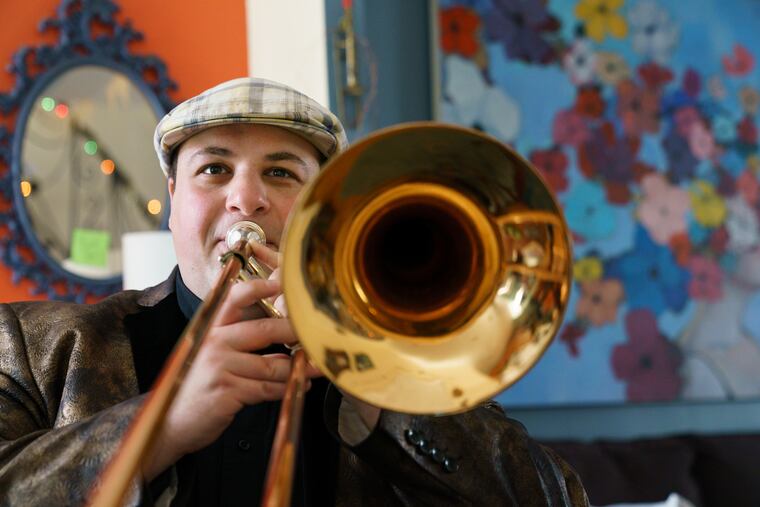Combining klezmer and jazz in West Philadelphia, in pieces that range from pop music to all-out free jazz chaos
One of Dan Blacksberg's collaborators is 94-year-old Sun Ra Arkestra member Marshall Allen

Trombonist Dan Blacksberg can easily walk from his home to Kol Tzedek, the West Philly synagogue where he serves as klezmer musician in residence. Both are just a few blocks from the Mothership, the small storefront venue where Blacksberg will take up a very different residency this weekend with his series Encounters @ the Mothership.
The proximity of these three sites seems to lay out Blacksberg’s musical life in geographical form, with klezmer and avant-garde jazz existing side by side, both being a close and vital part of his community.
“My klezmer work is extremely serious and busy and rigorous,” Blacksberg says, “and my jazz and improvised music is extremely serious and busy and rigorous, as well. I’ve gotten very comfortable playing to my strengths recently, and that includes being able to change hats very easily and to play a lot of different kinds of music with a lot of different people.”
In recent years, Blacksberg’s work in klezmer has begun to eclipse his life in jazz. He maintains a busy schedule teaching at international festivals like Klezkanada and Yiddish New York in addition to his responsibilities at Kol Tzedek. So he decided it was time to launch an event that would spur his experimental music side in an equally intense way.
Encounters @ the Mothership will feature four nights of concerts, each with a different ensemble of invited guests playing new music that ranges from solo chamber pieces to songs that border on pop music to all-out free jazz chaos. The lineup includes 94-year-old Sun Ra Arkestra bandleader and saxophonist Marshall Allen, pedal steel guitar improviser Susan Alcorn, and Temple University’s Boyer College Electroacoustic Ensemble Project, in addition to frequent local collaborators like drummer Mike Szekely, vibraphonist Ashley Tini, and guitarist Nick Millevoi, who has been playing with Blacksberg since the two were at Masterman High School together.
At the same time, Blacksberg is in the initial stages of composing a new piece for the Kimmel Center’s annual Jazz Residency program, to be premiered in June. Undertaken in collaboration with cantor Yosef Goldman, the project will explore the connections among Jewish, Arabic, and non-Jewish musical cultures. At a kick-off concert for the residency in January, Blacksberg offered a packed audience at SEI Innovation Studio, the intimate room tucked away in the Kimmel’s basement, a fairly exhaustive overview of the varied ways that jazz and klezmer have intertwined in his music throughout his career.
"I was learning about both of these things at the same time,” Blacksberg recalls. It was in high school that he started exploring adventurous jazz after hearing trumpeter Cuong Vu on J. Michael Harrison’s long-running WRTI-FM show The Bridge; around the same time, he started obsessively listening to Jews with Horns, the 1995 album by pioneering American klezmer band the Klezmatics.
Combining the two musical forms is far from a novelty. Almost as soon as the traditional music of Ashkenazi Jews landed on U.S. shores via Eastern European immigrants, jazz melded with and transformed what had traditionally been known as klezmer into its more familiar American variant.
But Blacksberg discovered echoes in other places, as well, most notably in the music of jazz legend Ornette Coleman, whose harmolodic theory has been key to Blacksberg’s own sonic experiments. “I think the harmolodic world is the key for experimentalizing musical cultures that have clear traditions,” he says. “In the case of Ornette’s early music, he did it for jazz; in the case of [his electric band] Prime Time, he did it with funk and rock. That to me is what’s interesting as an artist, to not take music away from where it comes from, but to push into where it lives.”
Blacksberg has done just that with bands that find unexpected resonances in distinct musical styles. Simcha fused klezmer, jazz, and hardcore punk, while Deveykus melded the slow, meditative melodies of Hasidic nigunnim with the heavy, droning sound of doom metal and the aggressive improvisation of free jazz. By collaborating with Goldman, Blacksberg introduces the traditions of Jewish music from the Middle East into the already rich mix.
For now, Blacksberg is simply looking forward to the new connections that will be forged through the four nights of his Encounters series. Whatever comes of the experience, he says, “I’m going to have played with all these people, not as a milestone for my career but so that I know what that feels like and what’s possible. Once you’ve done these things, instead of something you have to reach for, it becomes part of your story and your vocabulary. Then you can think about what’s next.”
MUSIC
Encounters @ the Mothership
8:15 p.m. Thursday-Sunday, Feb. 7-10, the Mothership, 602 S. 52nd St., $15 danblacksberg.com